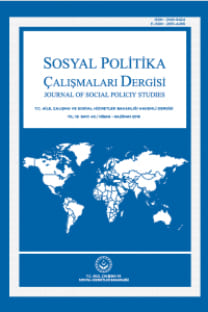TÜRKİYE’DE NEGATİF GELİR VERGİSİ SİSTEMİ ÖNERİSİNİN BÜTÇE AÇISINDAN DEĞERLENDİRİLMESİ
EVALUATION OF THE NEGATIVE INCOME TAX SYSTEM PROPOSAL IN TERMS OF THE BUDGET IN TURKEY
___
- Aktan C.C., Vural, İ.Y. (2002). “Yoksullukla Mücadele ve Negatif Gelir Vergisi Önerisi”, Ankara: Hak-İş Konfederasyonu Yayınları.
- Aktan, C.C., Vural, İ.Y. (2006). “Gelir Dağılımında Adaletin Sağlanması Açısından Negatif Gelir Vergisi Önerisi”, Vergileme: Vergi Teorisi ve Vergi Politikası, Ankara: Seçkin Yayınları.
- Ataç. B., Şener, O., Kirmanoğlu, H., Şenatalar, B. (2007). “Kamu Ekonomisi ve Devletin Ekonomideki Yeri”, Eskişehir: Anadolu Üniversitesi Yayını, No:789.
- Batırel, Ö.F. (1974). “Negatif Gelir Vergisi Sorunu”, İ.T.İ.A. Dergisi, İstanbul, 23-25.
- Boratav, K. (2012). “Yoksulluk, Bölüşüm, Kriz: Bazı Eleştirel Düşünceler”, Mülkiye Dergisi, sayı 36.
- Buğra, A. (2005). “Yoksulluk ve Sosyal Haklar”, Sivil Toplum Geliştirme Merkezi, Boğaziçi Üniversitesi Sosyal Politika Forumu.
- Chack-Kie, W. (2008). “Negative Income Tax and Its Relevancy to Hong Kong”, Social Work Department, The Chinese University of Hong-Kong.
- Çalışkan, Ş. (2010). “Türkiye’de Gelir Eşitsizliği ve Yoksulluk”, Sosyal Siyaset Konferansları, Sayı:59, 89-132.
- Davide, T. (2009). “Universal Basic Income and Negative Income Tax: Two Different Ways of Thinking Redistribution”, The Journal of Socio Economics, 246-255.
- Dawkings, P., Freebairn J. (1997). “Towards Full Employment”, Australian Economic Review, Vol:30, No:4, 405-417.
- Eckstein, O. (1973). “Public Finance (Third Edition)”, New Jersey: Prentice Hall, Inc.
- Friedman, M ve Friedman, R. (1988). “Kapitalism ve Özgürlük”, Çev:D. Erberk ve N. Himmetoğlu. İstanbul: Altın Kitaplar.
- Friedman, M. ve Rose. (1980). “Free to Choose”, New York: Harcourt Brace Jevanovich
- Giddens, A. (2000). “Üçüncü Yol: Sosyal Demokrasinin Yeniden Dirilişi”, Çev. Mehmet Özay, İstanbul: Birey Yayıncılık.
- Giray, F. (1989). “Negatif Gelir Vergisi ile Sosyal Yardımlaşma ve Dayanışmayı Teşvik Fonunun Niteliği ve Karşılıklı Değerlendirilmesi”, Maliye Yazıları, 103-113.
- Green, C. (1968). “Negative Taxes and Monetary Incentives to Work: The Static Theory”, Journal of Human Resources.
- Haveman, R.H. (1970). “The Economics Of Public Sector”, Newyork: John Wiley and Sons Inc.
- Howell, D.R. (1997). “Block and Manza on Negative Income Tax”, Politics & Society, Vol:25, No:4.
- Islam, N. (2018). “The Case For Negative Income Tax with Flat Tax in Europe”, An Empirical Optimal Taxation Exercise, Luxemburg Institute of Socio-Economic Research Ugo Colombino University of Torino, Ecıneq Society forthe Study of Economic Inequality, Working Paper Series, Italy, 1-53.
- Kabasakal, Ö. (1995). “Gelir Dağılımını Düzenleyen Bir Araç Olarak Negatif Gelir Vergisi”, Yeni Türkiye Dergisi, 183-185.
- Kargı, V. (1986). “Negatif Gelir Vergisi –Türkiye İçin Model Denemesi- “, Çukurova Üniversitesi SBE, Adana.
- Kershaw, D. N. (1972). “A Negative Income-Tax Experiment”, Scientific American, Vol:227, Number:4.
- Koca, M. (2015). “Sosyal Dışlanma Sorunu ve Asgari Gelir Desteğinin Gerekliliği”, Uluslararası Sosyal Araştırmalar Dergisi, Cilt: 8 Sayı: 39.
- Lopez-Daneri, M. (2016).” NIT Picking: The Macroeconomic Effects of a Negative Income Tax”, Journal Of Economic Dynamics and Control, Vol.68,1-16.
- Metin, B. (2012). “Yoksullukla Mücadelede Asgari Gelir Güvencesi: Türkiye’de Sosyal Yardım ve Hizmet Sisteminde Mevcut Durum ve Asgari Gelir Güvencesi İhtiyacı”, Sosyal Güvenlik Dergisi, 2012 / 1, 117-151.
- Moffitt, R. (1981). “The Negative Income Tax: Would It Discourage Work?”, Monthly Labor Review, 23-27.
- Moffitt, R. (1985). “A Problem with the Negative Income Tax”, Economic Letters, Volume:17, Issue:3, 261-265.
- Moffitt, R. (2003). “The Negative Income Tax and the Evolution of U.S. Welfare Policy”, Working Paper 9751, Natural Bureau of Economic Research.
- Öncel, T. 1980). “Gelirin Yeniden Dağılım Politikası Aracı Olarak Negatif Gelir Vergisi”, Maliye Araştırma Merkezi Konferansları, Sayı:8, İstanbul, 1-14.
- Petersen, H. G. (1995). “Pros and Cons of a Negative Income Tax”, Universitat Potsdam, Diskussionsbeitrag Nr.2,1-28.
- Ross, H. (1968). “An Experimental Study of The Income Tax”, Second Annual Meeting of the Community Services of Pennsylvania, Harrisburg,1-10.
- Sen, A. K. (1999). “Development as Freedom”, New York: Knopf Press
- Şahin, Serdar. (2008). “Gelir Vergisi Matrahının Belirlenmesinde Kişisel Harcamaların Dikkate Alınmasının Vergilendirmede Etkinlik Açısından Analizi ve Değerlendirilmesi”, Gazi Üniversitesi Sos. Bil. Enstitüsü, Maliye Anabilim Dalı, Ankara.
- Şenses, F. (2006). “Küreselleşmenin Öteki Yüzü Yoksulluk”, İstanbul, İletişim Yayınları
- Tondani, D. (2008). “Universal Basic Income and Negative Income Tax: Two Different Ways of Thinking Redistribution. University of Parma Department of Law”, Economics and International Finance, Italy,1-34.
- Yar, Fatih. (2015). “Türkiye’de Gelir Dağılımı & Yoksulluk”, Global Politika ve Strateji, Ankara.
- YUVALI, E. (2018). “Hak Temelli Sosyal Yardım ve Klientalizm”, TBB Dergisi.
- WALKER, A., WALKER, C. (1997). “Britain Divided: The Growth of Social Exclusion in The 1980s and 1990s”, London: Child Poverty Action Group
- TÜİK Yoksulluk Çalışmaları, Ekonomik Araştırma Forumu, Erişim Tarihi: 05.01.2019 http://eaf.ku.edu.tr/sites/eaf.ku.edu.tr/files/20122008- 3.pdf
- Aralık 2017 Açlık ve Yoksulluk Sınırı, Türk-İş Haber Bülteni, Erişim Tarihi: 26.02.2019 http://www.turkis.org.tr/Aralık-2017-Aclık-ve-Yoksulluk-Sınırı-d11671
- http://www.mlopezdaneri.com/MLDaneri/Research_files/NIT%20%28Final%20 Version%29.pdf, Erişim Tarihi: 12.02.2019.
- ISSN: 2148-9424
- Yayın Aralığı: 4
- Başlangıç: 2012
- Yayıncı: Aile,Çalışma ve Sosyal Hizmetler Bakanlığı
TÜRKİYE’DE NEGATİF GELİR VERGİSİ SİSTEMİ ÖNERİSİNİN BÜTÇE AÇISINDAN DEĞERLENDİRİLMESİ
AMERİKA BİRLEŞİK DEVLETLERİNDE GIDA BANKACILIĞI UYGULAMASI
Ferit ÇOBANOĞLU, Halil İbrahim YILMAZ
TÜRKİYE’DE GÖÇ VE SAĞLIK POLİTİKALARI ANALİZİ: “SIHHAT PROJESİ” ÖRNEĞİ
YAŞLILARLA SOSYAL HİZMETLERDE YENİ PARADİGMA: YAŞLILARI GÜÇLENDİRME
AMERİKA BİRLEŞİK DEVLETLERİ’NDE GIDA BANKACILIĞI UYGULAMASI
SOSYAL HİZMET UYGULAMASINDA BOWEN’IN AİLE SİSTEMLERİ YAKLAŞIMI
TÜRKİYE’DE SOSYAL HARCAMALAR VE EKONOMİK BÜYÜME İLİŞKİSİ
SOSYAL POLİTİKA VE SOSYAL REFAH AÇISINDAN TÜRKİYE’DE SOSYAL İNOVASYON VE İYİ UYGULAMA ÖRNEKLERİ
